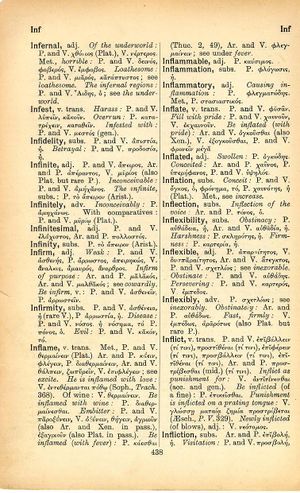infinite: Difference between revisions
From LSJ
Ζήτει σεαυτῷ καταλιπεῖν εὐδοξίαν → Tibi studeto gloriam relinquere → Dir guten Ruf zu hinterlassen sei bemüht
(D_5) |
(Gf-D_5) |
||
| Line 1: | Line 1: | ||
{{Woodhouse1 | {{Woodhouse1 | ||
|Text=[[File:woodhouse_438.jpg|thumb|link= | |Text=[[File:woodhouse_438.jpg|thumb | ||
|link={{filepath:woodhouse_438.jpg}}]]'''adj.''' | |||
P. and V. [[ἄπειρος]], Ar. and P. [[ἀπέραντος]], V. [[μυρίος]] (also Plat. but rare P.). | P. and V. [[ἄπειρος]], Ar. and P. [[ἀπέραντος]], V. [[μυρίος]] (also Plat. but rare P.). | ||
<b class="b2">Inconceivable</b>: P. and V. [[ἀμήχανος]]. | <b class="b2">Inconceivable</b>: P. and V. [[ἀμήχανος]]. | ||
| Line 9: | Line 10: | ||
}} | }} | ||
{{Gaffiot | {{Gaffiot | ||
|gf=<b>īnfīnītē</b>¹⁶ ([[infinitus]]), sans fin, sans limite, à l’infini : Cic. Or. 228 ; Ac. 1, 27 || d’une manière indéfinie, en général : Cic. de Or. 2, 66 ; Gell. 14, 7, 9. | |gf=<b>īnfīnītē</b>¹⁶ ([[infinitus]]), sans fin, sans limite, à l’infini : Cic. Or. 228 ; Ac. 1, 27 || d’une manière indéfinie, en général : Cic. de Or. 2, 66 ; Gell. 14, 7, 9.||d’une manière indéfinie, en général : Cic. de Or. 2, 66 ; Gell. 14, 7, 9. | ||
}} | }} | ||
Revision as of 07:25, 14 August 2017
English > Greek (Woodhouse)
adj.
P. and V. ἄπειρος, Ar. and P. ἀπέραντος, V. μυρίος (also Plat. but rare P.). Inconceivable: P. and V. ἀμήχανος. The infinite, subs.: P. τὸ ἄπειρον (Arist.).
Latin > English (Lewis & Short)
infīnītē: adv., v. infinitus.
Latin > French (Gaffiot 2016)
īnfīnītē¹⁶ (infinitus), sans fin, sans limite, à l’infini : Cic. Or. 228 ; Ac. 1, 27 || d’une manière indéfinie, en général : Cic. de Or. 2, 66 ; Gell. 14, 7, 9.

